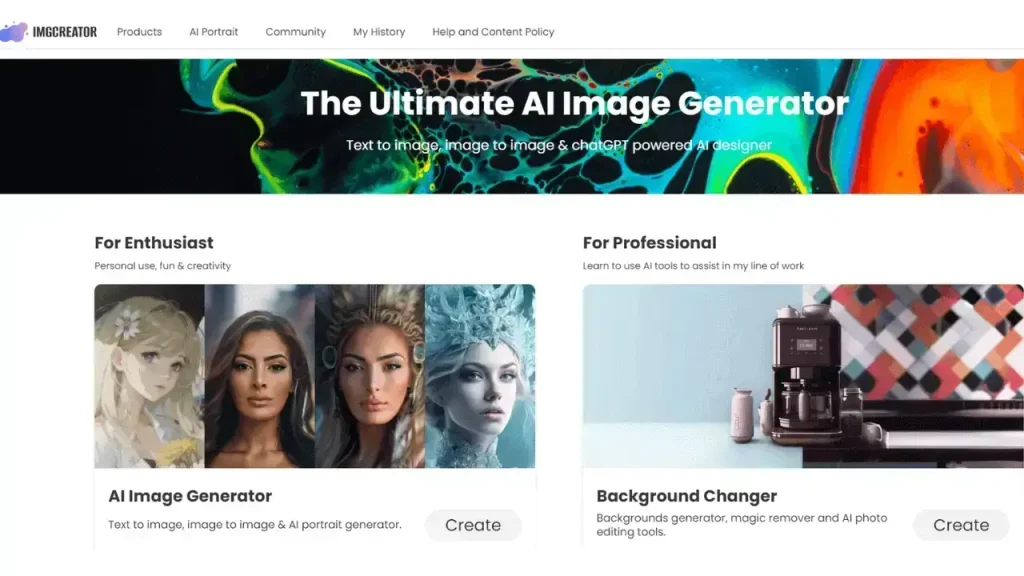How To Use AI To Edit And Generate Stunning Photo?
How to Use AI to Edit and Generate Stunning Photos?
Let’s dive into the world of artistry and technology, where AI has revolutionized the process of photo editing. Providing an array of powerful tools, AI is making photo editing more intuitive, accurate, and accessible than ever before.
Outline:
- How to Use AI to Edit and Generate Stunning Photos
- Introduction to AI in Photo Editing
- What is AI?
- Role of AI in Photo Editing
- Benefits of AI in Photo Editing
- Easy to Use
- Outstanding Features
- Affordability and Accessibility
- Step by Step Guide to Using AI for Photo Editing
- Upload Your Photo
- Select the Tools
- Post Process
- ZMO.AI: A Powerful AI-Based Photo Editing Suite
- ZMO AI Models
- Remover.app
- Background Remover
- Background Changer
- The Future of AI in Photo Editing
- Conclusion
- FAQs
Introduction to AI in Photo Editing
Artificial Intelligence (AI) refers to the simulation of human intelligence processes by machines, especially computer systems. These processes include learning, reasoning, problem-solving, and comprehension of complex data. Now, AI is leveraging its astounding capabilities to redefine photo editing.
Role of AI in Photo Editing
AI’s principal role within the realm of photo editing has arguably been that of a great simplifier, taking previously arduous tasks and making them accessible to all users, regardless of their skill level. The time-consuming and labor-intensive processes that have traditionally been associated with photo editing no longer present such lofty hurdles. Thanks to AI technology, these tasks could now be undertaken with just a few quick clicks, entirely removing the need for the hours of meticulous work that was once required of professional editors.
The automation capabilities of AI extend beyond simple time saving. The real beauty of this technology lies in its ability to analyze digital imagery to an astonishing degree of detail. AI has the capability to identify very specific patterns and abnormalities in an image, something which a human eye could easily miss even after strenuous examination. AI uses these patterns to gain an understanding of the image’s composition and potential flaws.
The final step that significantly puts AI onto a level of its own is its ability to provide recommendations for photo improvements or automatically apply changes, again, all within a matter of mere clicks. Following its detailed analysis, AI can offer suggestions to improve image quality or even adjust and perfect the image without requiring any human intervention. This autonomous capacity of AI photo editing tools effectively revolutionizes the pace and precision by which users – amateur or professional – can edit pictures currently.

Benefits of AI in Photo Editing
AI offers several key benefits that are taking photo editing to the next level, including:
Easy to Use:
AI software is ingeniously crafted with a user-centric design. This intuitive design approach prioritizes the user’s experience, making the software easily navigable even for those without technical expertise. The simplified interface and interactive visual cues guide users, empowering them to create stunning edits effortlessly. This ultimately serves to democratize the potential of AI-driven technology, bringing its power and versatility at everyone’s fingertips.
Simultaneously, this breed of AI software boosts productivity. It cleverly automates the repetitious and time-consuming aspects of digital editing, allowing users to focus more on creativity and less on mundane tasks. With reduced time spent on technicalities, users get to save valuable time. Hence, the innovative AI software not only enhances the quality of the edits but also significantly increases efficiency, reinforcing the crucial role of AI in today’s fast-paced digital world.
Outstanding Features:
AI-powered tools offer an impressive range of advanced features which are significantly transforming how we interact with digital content. They make tasks easy and fast to perform with features that allow for smart modifications. For instance, some software can effectively replace backgrounds, opening up possibilities for professional-level graphic editing even for amateurs. This feature can be invaluable for content creators, photographers, or even average social media users wanting to elevate the quality of their images.
Apart from offering background replacement options, AI tools can also remove unwanted objects from pictures with surprising accuracy. Unwanted intrusions in otherwise perfect shots can be erased without leaving visual traces. In addition, they are capable of automatically enhancing various image attributes such as brightness, contrast, and saturation. These capabilities ensure that even poorly-lit or dull images can be transformed into eye-catching, high-quality visuals with a few simple adjustments. This has reduced the need for complicated, time-consuming manual editing, making high-quality imagery accessible to all.
Affordability and Accessibility:
The advent of artificial intelligence in the field of photo editing has introduced a range of tools that are more affordable than traditional software. These AI-powered tools have democratized the realm of photo editing, making it accessible to a broader audience. Unlike conventional photo editing software that can often carry a hefty pricetag, these new offerings let amateur photographers and professionals alike enhance their work without a significant monetary investment.
Even more astonishing is the fact that some of these advanced photo editing tools are entirely free of charge. Despite offering a slew of editing options comparable to paid counterparts, these free tools exist at the intersection of affordability and capability. They have not only transformed the photo editing landscape but have also made it possible for anyone to get creative with their photos regardless of their budget.

Step by Step Guide to Using AI for Photo Editing
Making breath-taking edits with AI is generally a straightforward process:
Upload Your Photo:
Begin by launching the AI software on your device. Once open, navigate to the import section, typically located within a file or edit menu. From here, select the specific photo you wish to edit. This photo might be located in various places such as your device storage, cloud storage, or even attached to an email. Once chosen, confirm your choice and bring the photo into the workspace so as to be ready to undergo a range of edits using the AI software.
Select the Tools:
When setting out on your digital enhancements journey, it is important to be selective with the AI-enabled tools that you utilize. These applications could range from functions such as automatic color improvement to background removal, and even object removal. The tools you choose to use highly depend on the specific objectives you aim to accomplish with your project. Therefore, researching and choosing the right computational tools can not only streamline your process but can also significantly elevate the quality of your final output.
Post Process:
Begin by previewing the image to get an initial impression of the automated edits. Following this, it could be necessary to implement manual adjustments to enhance the photograph further. This procedure ensures that the image is fine-tuned beyond the standard improvements made by the automatic editing system, leading to more refined, personalized, and perfected results.
Save and Export:
After you have spent time thoughtfully editing your photo and you are satisfied with the final result, your next step is to secure your work. You should save your photo, thereby preserving all the changes made to it. This crucial step ensures that your hard work doesn’t get lost. Once saved, proceed to export the photograph. This step often involves converting the image into your preferred format, be it JPEG, PNG, TIFF, or any other. The exportation process helps to make your image shareable and usable across various platforms or for different purposes.
ZMO.AI: A Powerful AI-Based Photo Editing Suite
ZMO.AI is an excellent example of a platform utilizing AI’s transformative tech in photo editing. Here’s what makes it special:

ZMO AI Models:
ZMO.AI uses sophisticated AI algorithms, which understand the nuances of an image, enhance details, and perform appropriate edits.
Remover.app:
Are you seeking a solution to eliminate unwelcome objects spoiling the overall appeal of your photographs? Look no further than ZMO.AI, a state-of-the-art technology company. They provide an excellent tool named Remover.app, which is designed meticulously to erase undesired elements from your pictures, allowing their inherent beauty to shine through. This innovative application not only perfects your photo composition but also elevates the entire viewing experience.
Background Remover/Changer:
If you’re aiming to make your product distinct by eliminating its background or intending to modify an existing background in a photograph, ZMO.AI is your perfect ally. Their suite offers specialized tools designed precisely for these purposes, ensuring that your images not only meet your desired expectations but also stand out in any setting.

The Future of AI in Photo Editing
Right now, we’re only witnessing the dawn of an era, an era where Artificial Intelligence is just getting its first real taste of the wide array of possibilities it holds within the domain of photo editing. When we discuss such a technological development, we don’t say these things lightly, given that what we are seeing is simply the tip of the iceberg of what the future holds. This future, marked by the evolution and enhancement of AI, paints a picture of promise and potential.
Like any transformative technology, AI is certain to go through a period of rapid evolution. It will manifest its capabilities in leaps and bounds, way beyond our current comprehension of it. This metamorphosis promises to serve up a thrilling variety of automatic edits. The enhancements will be such that manual interference becomes almost unnecessary. It’s an exciting prospect for sure, saving time and effort while possibly outclassing human proficiency in terms of speed and efficiency.
But here’s where it gets really intriguing. Artificial Intelligence, at its core, operates on the principles of learning and adaptation. That is to say, AI can learn from the users who interact with it, tuning itself based on those interactions. It analyzes the inputs it has learned from multiple users, understands the patterns and extrapolates the information to improve its capabilities even further, thus making infinitely more accurate predictions.
And with accuracy comes customization. Putting it simply, AI can provide a more personalized photo editing experience. Based on the user’s previous inputs and preferences, AI can tailor-make its suggestions and modifications. Like an artist who knows their client’s tastes inside and out, AI will tailor its edits to the personal taste and preference of each individual user. This degree of personalization will not only increase the user’s satisfaction but also promises to take the photo editing experience to an entirely new level.
In sum, the journey of AI in the realm of photo editing is an exciting one, from just scraping the surface today to uncovering unimaginable potential tomorrow. Its promise to deliver automatic edits, learn from the user inputs, improve its prediction accuracy, and offer a more personalized editing experience is not simply a hypothetical concept but a tangible reality in the making.
Conclusion
Artificial Intelligence’s inclusion into the world of photo editing has remarkably empowered regular users with tools once reserved for professional photographers. This disruptive integration has made photo editing highly accessible, diminishing the challenging learning curve with easy-to-use, intuitive interfaces. Advances in technology ensure that detailed edits, which would typically necessitate professional skills and hours of work, can now be achieved rapidly and with incredible precision.
Platforms such as ZMO.AI have epitomized the potential of AI in photo editing. By offering smart, versatile capabilities, they have set the standard for what’s possible in the space. This pioneering leadership signals a future in which machines play an increasingly significant role in photo editing. AI technology not only makes photo editing more affordable for diverse users but also underlines a future of limitless creative prospects.
FAQs
Q1: What is AI in photo editing?
AI in photo editing refers to the application of artificial intelligence technologies to automate and enhance the process of editing digital photos.
Q2: How do I use AI to edit photos?
Using AI to edit photos involves uploading your image to an AI-powered editing platform, selecting the tools or features you want to use, and letting the AI algorithms do the work.
Q3: What are the benefits of using AI for editing photos?
AI brings numerous benefits to photo editing, including ease of use, affordability, and access to advanced features that can significantly enhance images.
Q4: Can AI replace professional photo editors?
While AI has made significant strides in automating many editing tasks, it’s not a substitute for a professional photo editor’s trained eye and technical skills.
Q5: What is ZMO.AI?
ZMO.AI is a powerful AI-driven photo editing suite that includes tools for object removal, background change, and other image enhancement tasks.









